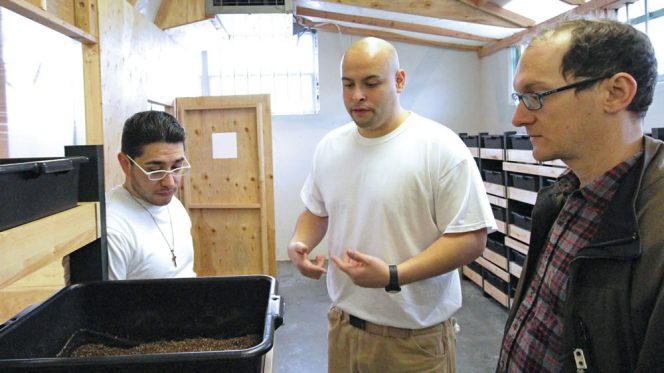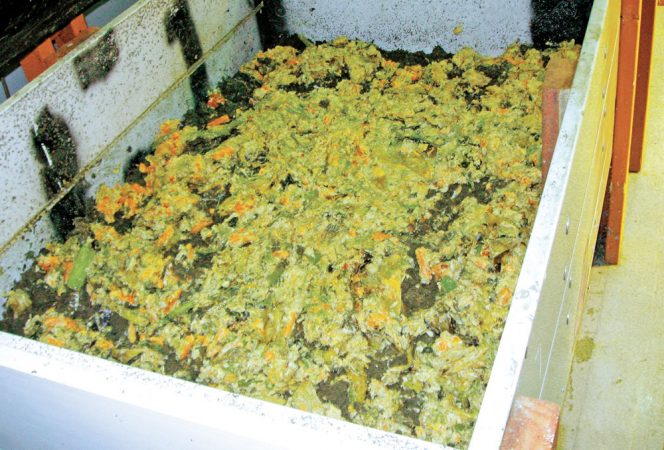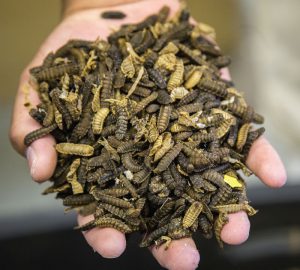My journey from a gang member to a Master Vermiculture Specialist.
Juan Carlos Hernandez
BioCycle May 2018
The deafening sounds of screeching tires and three gunshots shatter the silence. It was a rainy summer night. I was 19-years old and had just made the worst decision imaginable. A young man’s life was lost and mine was changed forever. Thus began a journey that would take me from rock-bottom to redemption and enlightenment by way of sustainability. This is my story.

Author Juan Carlos Hernandez (center) explains use of black soldier flies to manage food waste. Also pictured: Rudy Madrigill of the Worm Farm (left) and Justin Maltry, Tilth Alliance (right). Giving tours is a component of the public speaking requirements in the Vermiculture and Composting Specialist certification. Photo by Bethany Shepler
Despite his run-ins with the law my father still respected authority and passed that value on to me. I grew up in a neighborhood where gang activity was prevalent and I despised gangs and what they do to communities. But when I was 13-years old, I was threatened with a gun in my face by a police officer because he assumed I was a gang member. This was a turning point in my life. I remember thinking that no matter what I did I would always be treated like a gang member.
In a matter of months I went from varsity athlete to a full-fledged gang member. At first I tried to balance my normal life with gang life but eventually they merged. Chaos ensued. In the 11th grade I was expelled from school following a series of gang fights. I started hanging out with older gang members and girls and soon I was hustling drugs and carrying pistols.
Everything changed for me on that tragic night. In one moment I betrayed the values instilled in me by my loved ones and all the positive influences from my community. In a brazen act of cowardice I took the life of another. I have never been sorrier for anything I have ever done in my whole life. At times the guilt and shame I feel are unbearable. However I would eventually use those feelings as motivation to change my life.
Incarceration — The Early Years
My first couple of years in prison were a daily struggle to accept what I had done and learn to navigate my new environment for the next 20 years. Even though I knew I had done a terrible thing and deserved to be here, it is almost impossible for a young man to imagine spending more time in prison than he has been alive. I spent much of my time in solitary confinement.
At some point, I started to identify areas in my character that needed improvement but I was still in a terrible environment for change. Then I caught a break. I was transferred to the Washington State Reformatory, which houses a higher percentage of long-term prisoners. I quickly learned that these “lifers” are the ones most likely to encourage a young man to make positive changes in his life. I ended up becoming friends with Oscar, one of the best guys I have ever known. Oscar had done a lot of time in prison and navigated his way out of the same gang I was involved in. He never stopped giving me great advice and was always patient when I was foolish.
After a while, Oscar was able to get me a job in a highly restricted work area where only well behaved prisoners are allowed to work. It was a job as a gardener, and a great opportunity to spend more time outside — a commodity when in prison. On my first day, I found out that our office was located at the “Worm Farm.” I had absolutely no idea what the worm farm was or what it did — I honestly thought people were joking with me when they told me what it was. I was also introduced to this guy named “Nick” or “the Worm Guy.” We did not get along right away, but as the months went by, we found out that we had a lot in common and our friendship and respect for one another grew.
Worm Farming
Soon, I started picking Nick’s brain about everything sustainable. Of course his love for vermiculture was clear and he started teaching me all about the worm farm. Before long, I was an honorary worm farmer, since I spent so much time helping around the place. During this time Nick’s advice was priceless since I was still a bit lost on what my long-term future goals were. One of the things Nick would ask me, which really stuck, is what kind of a world I want my son to grow up in. I became very conscious about environmental issues and started paying attention to terms like “global warming” and “the melting ice caps”. My awareness was fueled by my love for my 8-year old son, who I want to have a clean and beautiful planet to live in when he grows up and has a family of his own.
During my time at the worm farm, our team began to do all kinds of cool scientific trials with vermiculture and Bokashi composting. We also started a pilot program with Black Soldier Flies. That was a subject not many people knew about so to be privileged to study and figure the flies out was awesome. Oscar’s brother Rudy started at the worm farm a short time after me and has become an expert on Black Soldier Flies.
You just can’t imagine how big of an impact working with nature and studying the environment has on people who spend most of their days inside concrete cages. It is an amazing feeling to be inside a prison and still feel like you are impacting the planet in a positive way.
I remember the day when Nick said he needed to speak to me in the office. I thought I had done something bad. It almost felt like I was going to see the school principal. As soon I entered I knew it wasn’t anything negative. Nick asked if I would be comfortable taking over the management of the Worm Farm as he was going to move into an instructor role. First I had my doubts but he wouldn’t let that seed grow, reinforcing the fact that I had the knowledge and leadership skills. It was an honor because Nick was the one who started the Worm Farm.
Nick turned his attention to one of the biggest goals we have had at the Worm Farm: Creating a vocational training program to give guys something tangible in the way of skills. With the help of several organizations, we fashioned a 1,000-hour certification program (see accompanying article). One section of the certification includes 40 hours of public speaking. I was terrified, as I had never been much of a public speaker. Nick made sure that would change forever. He insisted that we all get trained to give tours to the public, including college professors and students, prison officials, scientists and even visitors from other countries.
It was definitely hard but I had fun completing the certification, and gained so much knowledge and experience. Along the way, I cultivated many great professional relationships and met genuine environmental heroes. I also learned an amazing amount about environmental issues and developed real skills for improving the planet. I will always carry the lessons and experiences that I went through and apply those to my life. I am so proud that I could be part of the very first class of students for this certification.

Fermented food scraps are added to the vermicomposting bin at the Worm Farm. Photo courtesy of Monroe Correctional Facility
A New Vision
My time at the Worm Farm has been transcending, not just because I’m now a vermiculture specialist but also because it’s changed the way in which I see the world. I used to think that one person couldn’t make much of a difference. Now I know for a fact that my future is bright and I’m going to change the way people look at sustainability.
My past has been a big motivating factor for my change. My son is the fuel to my engine and is the driving force for my goals and ambitions. For him, I will do everything in my capabilities to leave this world looking, smelling and feeling better then when I arrived. One day he will raise a family of his own and he can tell his children what I taught him.
At one point in my life society was ready to throw me away for good. But something beautiful and unintended happened. The way in which people responsibly get rid of food waste has not only showed me how to save the world, it has returned my humanity and self-worth — and given me a clear path for a career upon release. And it has definitely repurposed me as a human being and given me a way to redemption.
Juan Carlos Hernandez is lead Vermicomposting Technician at the Monroe Correctional Facility in Monroe Washington. He is scheduled to be released from prison in 2029.











